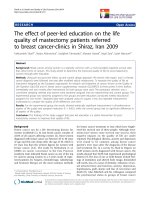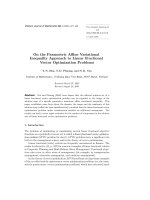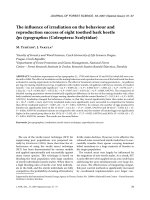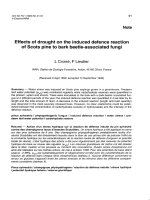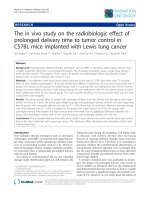FCE Reading 2010
Bạn đang xem bản rút gọn của tài liệu. Xem và tải ngay bản đầy đủ của tài liệu tại đây (191.57 KB, 2 trang )
<span class='text_page_counter'>(1)</span><div class='page_container' data-page=1>
November 2010
<b>FCE Sample Test</b>
<b>Reading – Part 1</b>
You are going to read an extract from a novel. For questions 1-8, choose the answer
(A, B, C or D) which you think fits best according to the text.
Many trees in the Brackham area were brought down in the terrible storms that March.
The town itself lost two great lime trees from the former market square. The disappearance
of such prominent features had altered the appearance of the town centre entirely, to the
annoyance of its more conservative inhabitants.
Among the annoyed, under more normal circumstances, would have been Chief
Inspector Douglas Pelham, head of the local police force. But at the height of that week’s
storm, when the wind brought down even the mature walnut tree in his garden, Pelham
had in fact been in no fit state to notice. A large and healthy man, he had for the first time
in his life been seriously ill with an attack of bronchitis.
When he first complained of an aching head and tightness in his chest, his wife, Molly,
had tried to persuade him to go to the doctor. Convinced that the police force could
not do without him, he had, as usual, ignored her and attempted to carry on working.
Predictably, though he wouldn’t have listened to anyone who tried to tell him so, this
has the effect of fogging his memory and shortening his temper.
It was only when his colleague, Sergeant Lloyd, took the initiative and drove him
to the doctor’s door that he finally gave in. By that time, he didn’t have the strength
left to argue with her. In no time at all, she was taking him along to the chemist’s to
get his prescribed antibiotics and then home to his unsurprised wife who sent him
straight to bed.
When Molly told him, on the Tuesday morning, that the walnut tree had been brought
down during the night, Pelham hadn’t been able to take it. On Thursday evening, he had
asked weakly about damage to the house, groaned thankfully when he heard there was
none, and pulled the sheets over his head.
It wasn’t until Saturday, when the antibiotics took effect, his temperature dropped
and he got up, that he realised with a shock that the loss of the walnut tree has made a
permanent difference to the appearance of the living room. The Pelhams’ large house
stood in a sizeable garden. It had not come cheap, but even so Pelham had no regrets
about buying it. The leafy garden had created an impression of privacy. Now, though,
the storm had changed his outlook.
Previously, the view from the living room had featured the handsome walnut tree.
This had not darkened the room because there was also a window on the opposite wall,
but it had provided interesting patterns of light and shade that disguised the true state
of the worn furniture that the family had brought with them from their previous house.
With the tree gone, the room seemed cruelly bright, its worn furnishings exposed
in all their shabbiness. And the view from the window didn’t bear looking at. The tall
house next door, previously hidden by the tree, was now there, dominating the outlook
with its unattractive purple bricks and external pipes. It seemed to have a great many
upstairs windows, all of them watching the Pelhams’ every movement.
‘Doesn’t it look terrible?’ Pelham croaked to his wife.
But Molly, standing in the doorway, sounded more pleased than dismayed. ‘That’s
what I’ve been telling you ever since we came here. We have to buy a new sofa,
whatever it costs.’
line 17
</div>
<span class='text_page_counter'>(2)</span><div class='page_container' data-page=2>
<b>FCE Sample Test</b>
November 2010
<b>Answers:</b>
<b>Part 1: </b>1A, 2B, 3D, 4D, 5B, 6B, 7C, 8D
<b>1 </b> Why were some people in Brackham annoyed after the storm?
<b>A </b> The town looked different.
<b>B </b> The police had done little to help.
<b>C </b> No market could be held.
<b>D </b> Fallen trees had not been removed.
<b>2 </b> In the third paragraph, what do we learn about Chief Inspector Pelham’s general attitude
to his work?
<b>A </b> He finds it extremely annoying.
<b>B </b> He is sure that he fulfils a vital role.
<b>C </b> He considers the systems are not clear enough.
<b>D </b> He does not trust the decisions made by his superiors.
<b>3 </b> Who does ‘her’ in line 17 refer to?
<b>A </b> Molly Pelham
<b>B </b> the doctor
<b>C </b> the chemist
<b>D </b> Sergeant Lloyd
<b>4 </b> When Inspector Pelham’s wife first told him about the walnut tree, he appeared to be
<b>A </b> worried.
<b>B shocked.</b>
<b>C saddened.</b>
<b>D uninterested.</b>
<b>5 </b> What aspect of the Pelhams’ furniture does ‘shabbiness’ in line 36 describe?
<b>A </b> its colours
<b>B </b> its condition
<b>C </b> its position
<b>D </b> its design
<b>6 </b> As a result of the storm, the Pelhams’ living room
<b>A </b> was pleasantly lighter.
<b>B </b> felt less private.
<b>C </b> had a better view.
<b>D </b> was in need of repair.
<b>7 </b> Why did Molly sound pleased by her husband’s comment?
<b>A </b> It proved that he was well again.
<b>B </b> She agreed about the tree.
<b>C </b> She thought he meant the sofa.
<b>D </b> It was what she expected him to say.
<b>8 </b> From what we learn of Inspector Pelham, he could best be described as
<b>A </b> open-minded.
</div>
<!--links-->



